Adaptation to CEFTA Students (Bachelor, Trade)
Adaptation to the students of the CEFTA (Bachelor of Science in International Trade, e-learning, fourth semester, second year)
| Bachelor of Science in International Trade |

The Countries of the CEFTA are Albania, Bosnia and Herzegovina, Macedonia, Moldova, Montenegro, Serbia, and Kosovo.
Common Subjects for all CEFTA Students.
Syllabus of the Subject: Central European Free Trade Agreement (CEFTA)
- Introduction to the CEFTA
- CEFTA Structures
- International Trade portal
- CEFTA The Economic Profile of the Central European markets: Albania, Bosnia and Herzegovina, Macedonia, Moldova, Montenegro, Serbia, and Kosovo
Objectives:
- To understand the objectives of the
- To evaluate the benefits for the member countries of the Central European FTA
- To explore free trade agreements related to the CEFTA countries
Common Subjects for the students from Albania, Bosnia and Herzegovina, Macedonia, Montenegro, Serbia and Kosovo
Syllabus of the Subject: European Union-Western Balkans:
- Introduction to the Western Balkans region
- The EU Foreign Policy for the Balkans
- Stability Pact for South-Eastern Europe
- Free-trade area between the EU and the Western Balkans
- The EU Stabilization and Association Agreements
- Trade relations between the EU and the Western Balkans
Objectives:
- To know the EU Trade Policy for the Western Balkans
- To analyze the association agreements and trade relations of the EU with the Western Balkans countries
Syllabus of the Subject: European Union Enlargement.
- The EU Enlargement policy
- Conditions for the enlargement
- Benefits of enlargement
- Process of joining to the EU
- The EU strategy for the accession of new countries
Objectives:
- To know the EU's Enlargement Process
- To analyze the EU's strategies for the accession of Macedonia, Albania, Bosnia and Herzegovina, Montenegro, Serbia, and Kosovo
Common Subjects for the students from Albania, Moldova, and Serbia
Syllabus of the Subject: Black Sea Economic Cooperation (BSEC).
- Introduction to the Organization of the Black Sea Economic Cooperation
- Areas of Cooperation of the BSEC: Customs, Transport and Trade
- Black Sea Trade and Development Bank
Objectives:
- To understand the aims and functions of the BSEC
- To analyze the areas of cooperation of the Organization of the Black Sea Economic Cooperation
- To evaluate the role of the Black Sea Trade and Development Bank
Common Subjects for the students from Albania, Bosnia and Herzegovina, Serbia and Montenegro
Adriatic-Ionian Initiative
- Introduction to the Adriatic-Ionian Initiative
- Adriatic-Ionian Region
- The EU Strategy for the Adriatic-Ionian Region
Common Subjects for the students from Albania, Bosnia and Herzegovina, Macedonia, Moldova, Montenegro, and Serbia
Syllabus of the Subject: Central European Initiative (CEI).
- Introduction to the Central European Initiative
- CEI Funds and Instruments
- Areas of Activity of the CEI
- Pan European Corridor VIII
Objectives:
- To understand the aims and functions of the CEI
- To know the areas of cooperation of the CEI
- To analyze the Pan-European Corridor VIII
Common Subjects for the students from Albania, Bosnia and Herzegovina, and Montenegro.
Syllabus of the Subject: Euro-Mediterranean Partnership (EUROMED).
- Introduction to the Euro-Mediterranean Partnership (EUROMED)
- Barcelona Process and the Union for the Mediterranean
- Trade Relations between the EU and the Southern Mediterranean countries
- Euro-Mediterranean Free Trade Zone
- System of pan-Euro-Mediterranean accumulation of origin
Objectives:
- To know the basics of the Euro-Mediterranean Partnership
- To investigate trade relations and association agreements that the EU has with the Southern Mediterranean countries
Common Subjects for the students from Albania and Bosnia and Herzegovina
Syllabus of the Subject: Organization of Islamic Cooperation (OIC)
- Introduction to the Organization of Islamic Cooperation (OIC)
- Organization of Islamic Cooperation and the Ummah
- Economic Report on the Organization of Islamic Cooperation countries
- Committee for Economic Cooperation (OIC)
- Islamic Chamber of Commerce and Industry
- Statistical, Economic and Social Research and Training Centre for Islamic Countries
- Islamic Centre for Development of Trade
- Cairo Declaration on Human Rights in Islam
Trade Preferential System among the Member States of the OIC
- Introduction to the Trade Preferential System of the OIC
- Framework Agreement of the Trade Preferential System
- Protocol on the Preferential Tariff Scheme
- Rules of Origin under the Trade Preferential System
Cairo Declaration
- Introduction to the Human Rights in Islam
- Cairo Declaration on Human Rights in Islam promulgated by the OIC
- The Sharia and the concept of “Islam, as a representative of Allah on earth”
- Universal Declaration of Human Rights (United Nations) and the Cairo Declaration
Objectives:
- To understand the goals and the areas of cooperation of the OIC
- To learn about the relationships of the OIC with the Ummah
- To know the affiliated institutions of the OIC
- To understand the role of the Islamic Centre for Development of Trade and the Islamic Chamber of Commerce and Industry
- To analyze the Trade Preferential System among the OIC Member States
Syllabus of the Subject: Islamic Development Bank
- Introduction to the Islamic Development Bank (IDB)
- Member Countries of the IDB
- IDB Unit of Account (Islamic dinar)
- Strategic framework of the IDB Bank Group
- Project financing operations
- Modes of Financing and the IDB
- ISTISNA'A
- IDB and Shari'ah (Islamic Law)
- Islamic Corporation for Insurance of Investments and Export Credits
- International Islamic Trade Finance Corporation
- Arab Foreign Trade Financing
- Arab Export Financing Scheme
Objectives:
- To understand the goals, structure and functions of the IDB
- To identify the areas of cooperation of the IDB
- To know the IDB's role in promoting the Sharia, Islamic Economics, and finance
- To analyze the methods of financing of the IDB and the solutions for financing exports
- To evaluate the funds and financial instruments of the IDB
- To know the IDB affiliated institutions
- To understand the IDB project cycle
Specific Subjects for Albanian Students.
Syllabus of the Subject: Albanian Economy and International Trade
- Introduction to Albania: The third chromium producer in the world
- Albanian Economy
- Albanian International Trade
- Trade Agreements: Albania-Turkey, Albania-EFTA
Objectives:
- To analyze the Albanian Economy and Global Trade
- To investigate the Albanian trade relations
- To know Albanian free trade agreements
Albania-European Free Trade Association Free Trade Agreement.
- Introduction to the EFTA-Albania FTA
- Topics covered by the EFTA-Albania FTA
- Foreign Trade between Albania and the European Free Trade Association Member States
Specific Subjects for Bosnian and Herzegovinian Students.
Syllabus of the Subject - Bosnian-Herzegovinian Economy and International Trade
- Introduction to Bosnia and Herzegovina
- Bosnian-Herzegovinian Economy and Global Trade
- Bosnia and Herzegovina's Free Trade Agreement with the EFTA, Turkey, Bulgaria and the Stabilization and Accession Agreement with the EU
Objectives:
- To analyze the Bosnian-Herzegovinian Economy and Global Trade
- To investigate trade relations of Bosnia and Herzegovina
- To explore free trade agreements of Bosnia and Herzegovina
Specific Subjects for Macedonian Students.
Syllabus of the Subject - Macedonian Economy and International Trade
- Introduction to Macedonia
- Macedonian Economy and Global Trade
- Macedonian Free Trade Agreement with the EFTA States, and Turkey
Objectives:
- To analyze the Macedonian Economy and Global Trade
- To investigate trade relations of Macedonia
- To explore free trade agreements of Macedonia
Specific Subjects for Moldovan Students.
Syllabus of the Subject - Moldovan Economy and International Trade
- Introduction to Moldova
- Moldovan Economy
- Moldovan International Trade
- The EU relations with Moldova
- Moldovan Free Trade Agreements with Azerbaijan, Armenia, Georgia, Turkey, China, and the Kyrgyz Republic
- Moldova is an observer country in the Eurasian Economic Community (EurAsEC)
Objectives:
- To analyze the Moldovan Economy and Global Trade
- To investigate trade relations of Moldova
- To explore free trade agreements of Moldova
European Union-Moldova Association Agreement.
- Introduction to the Association Agreement between the EU and Moldova
- Key features of the Moldova-EU Association Agreement
- Rules of Origin
Syllabus of the Subject: EU Eastern Partnership
- Introduction to the EU Eastern Partnership
- Association Agreement and Deep and Comprehensive Free-Trade Area of the EU with Moldova
- Trade relations EU-Moldova
Objectives:
- To know the fundamentals of the EU Eastern Partnership
- To analyze the EU's Trade Relations, Association Agreements and Deep and Comprehensive Free-Trade Area with Moldova
Specific Subjects for Montenegrin Students.
Syllabus of the Subject - Montenegrin Economy and International Trade
- Introduction to Montenegro
- Montenegrin Economy and Global Trade
- Montenegro-EU Stabilization and Accession Agreement
- Montenegrin free trade agreements with the EFTA, Ukraine and Russia
Objectives:
- To analyze the Montenegrin Economy and Global Trade
- To investigate trade relations of Montenegro
- To know the Montenegrin free trade agreements
Specific Subjects for Serbian Students.
Syllabus of the Subject: Serbian Economy and International Trade
- Introduction to Serbia
- Serbian Economy and Global Trade
- Agreement with the EU
- Agreements with the EU, Russia, Turkey, EFTA, Belarus, and Kazakhstan
Objectives:
- To analyze the Serbian Economy and Global Trade
- To explore Serbian trade relations
- To know Serbian Free Trade Agreements
Serbia-European Free Trade Association Free Trade Agreement.
- Introduction to the Serbia-EFTA FTA
- Topics covered by the Serbia-EFTA Agreement
- Foreign Trade between EFTA Countries
Samples of the adaptation to CEFTA Students (Bachelor of Science in International Trade, e-learning, fourth semester, second year):
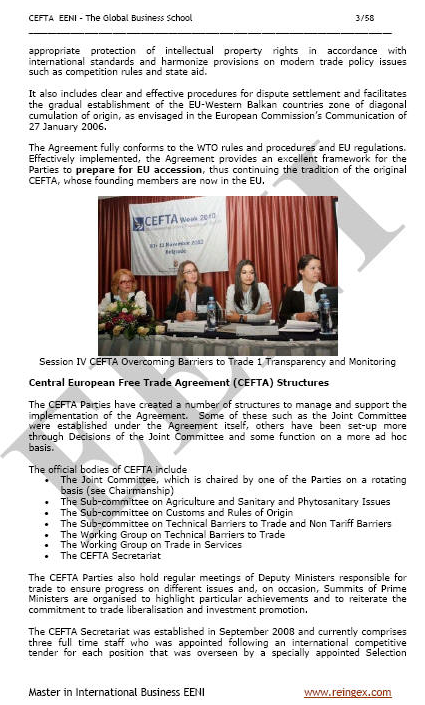
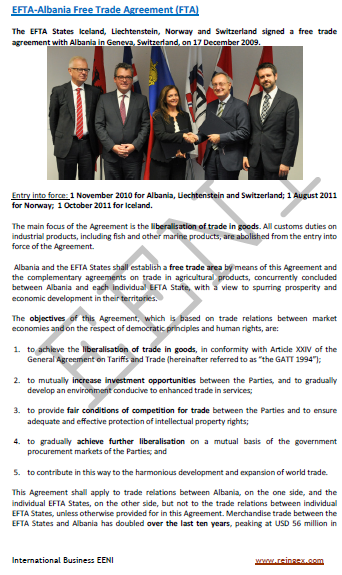
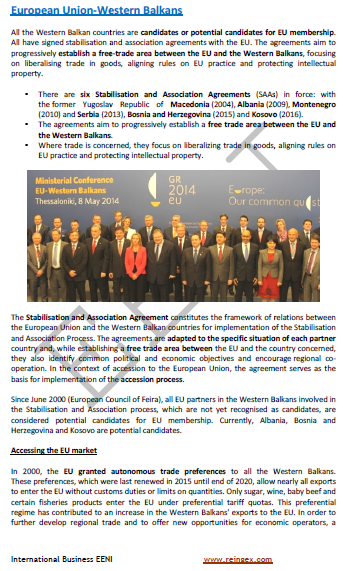
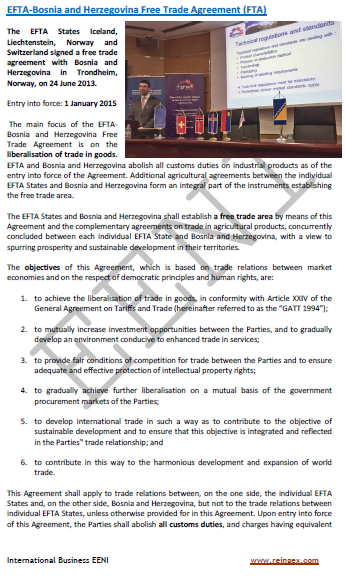
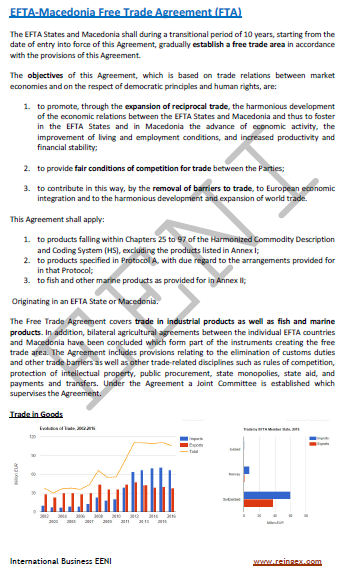
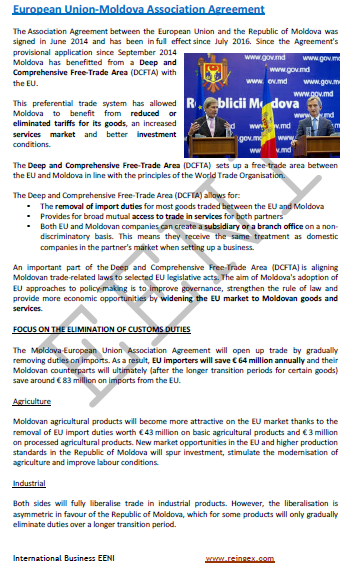
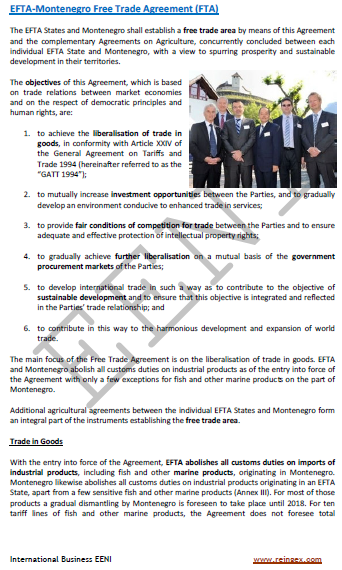
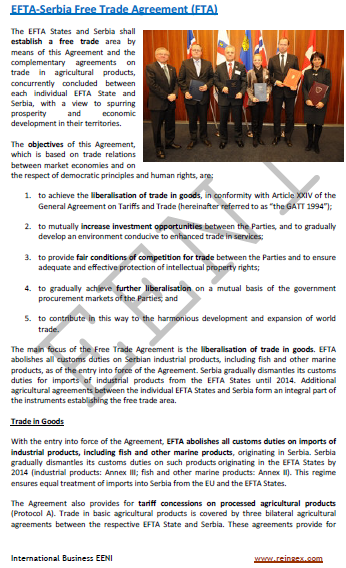
Languages:  or or
or or  EENI
EENI  EENI
EENI  EENI.
EENI.
(c) EENI Global Business School (1995-2024)
We do not use cookies
Top of this page

